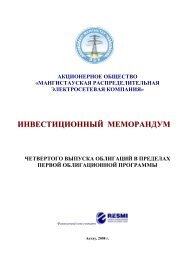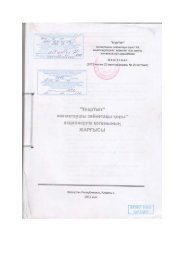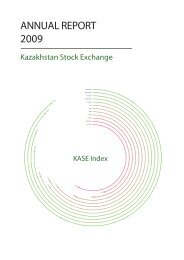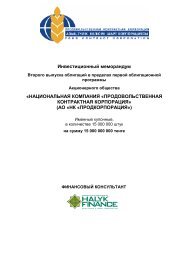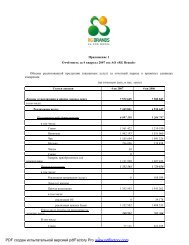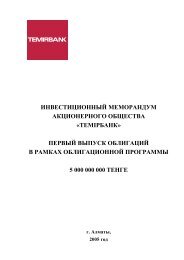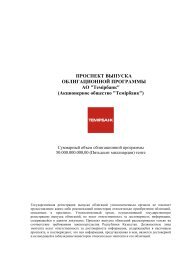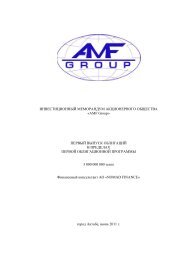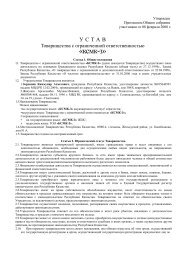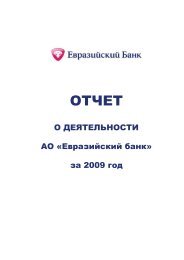JPMorgan - KASE
JPMorgan - KASE
JPMorgan - KASE
You also want an ePaper? Increase the reach of your titles
YUMPU automatically turns print PDFs into web optimized ePapers that Google loves.
Under the Constitution, the President also enjoys significant powers of appointment, including<br />
the power to appoint the Prime Minister subject to the approval of the Parliament, but the<br />
President may dismiss the Prime Minister and members of the Government without<br />
Parliamentary approval. In addition, the President has the power to appoint and remove the<br />
Governor of Kazakhstan’s central bank, the NBK, whose appointment is subject to the approval<br />
of Parliament.<br />
The Constitution provides that the President is elected to office by popular vote for a term of<br />
seven years. The Constitution also provides for early termination of the President’s term of office<br />
in the event of death, resignation or impeachment. New presidential elections must be held<br />
within two months of any such early termination.<br />
The then First Secretary of the Communist Party of Kazakhstan, Nazarbayev, became President of<br />
Kazakhstan with the formation of the newly independent State in December 1991 and has held<br />
the position of head of the executive branch of the State since that time. His presidency has been<br />
confirmed in referenda in December 1991 and April 1995. President Nazarbayev was re-elected in<br />
elections held in January 1999 and his current term of office expires in 2006.<br />
President Nazarbayev has had and continues to have a dominant influence on economic and<br />
political life in the country. In December 1993, Kazakhstan’s Parliament voted to dissolve itself<br />
prior to the end of its term and to give the President the power to adopt laws. In March 1995,<br />
Parliament was again dissolved following a ruling of the former Constitutional Court declaring<br />
the 1995 Parliamentary elections invalid due to election law violations. Thus, from December<br />
1993 until April 1994, and from March 1995 through January 1996, legislative functions were<br />
vested solely in the President. During these periods, the President brought into effect over 100<br />
ordinances and decrees which represent the legislative framework for much of the economic and<br />
structural reforms currently being pursued by the Government.<br />
The Government comprises the Prime Minister, as its executive head, and deputy prime ministers<br />
and ministers as members of the cabinet. The Government is formed by the President, based on<br />
recommendations of the Prime Minister, for a term of five years, and is automatically dissolved<br />
after each presidential election, to allow for the formation of a new administration by the<br />
President. Neither the Prime Minister nor the members of the cabinet are members of<br />
Parliament. The Government is responsible for implementing laws, decrees and international<br />
agreements, preparing and implementing the budget, establishing fiscal policy, carrying out<br />
social policy and defending the rights and freedoms of citizens.<br />
In January 1999, the President re-organized the Government following his re-election. Nurlan U.<br />
Balgimbayev, formerly President of Kazakhoil, was re-appointed Prime Minister having held that<br />
position since 1997. In October 1999, Mr. Balgimbayev resigned as Prime Minister, returning to<br />
Kazakhoil as its president. He was succeeded by Kasymzhomart Tokayev, the former Foreign<br />
Minister of Kazakhstan and Mazhit Esenbayev, a governor of one of Kazakhstan’s regions,<br />
became Minister of Finance.<br />
On 28 January 2002, Mr. Tokayev resigned as Prime Minister and was replaced by Imangali<br />
Tasmagambetov, who was appointed by the President and confirmed by Parliament. The<br />
previous major restructuring of the Kazakhstan Government occurred in December 2000.<br />
Presidential Decree No. 931, dated 28 August 2002, called for the reorganization of state<br />
administration in the Republic. The former Ministry of Economy and Commerce was split into the<br />
Ministry of Economy and Budget Planning and the Ministry of Industry and Commerce, the latter<br />
assuming responsibility, inter alia, for development of industry, construction and trade. The<br />
Ministry of Industry and Commerce also assumed responsibility in the state support of direct<br />
investment and small business. The former Ministry of Finance was split into the Ministry of<br />
Finance and the Agency for State Procurement. The budgetary planning responsibility of both<br />
ministries were transferred to the Ministry of Economy and Budget Planning. The former Ministry<br />
B-3




